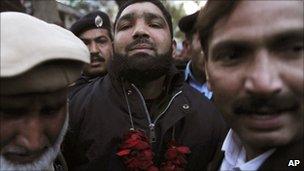Pakistan viewpoint: Who is to blame for Taseer's death?
- Published

Malik Mumtaz Hussein Qadri has been received as a hero by some Pakistani's
The killing of Punjab Governor Salman Taseer has been described in the country's media as awful, tragic and "a grim commentary on the state of affairs in Pakistan". Author Mohammed Hanif asks whether a Pakistani culture which fails to challenge extremism is in part to blame.
When Pakistan's television anchors and newspaper columnists describe Salman Taseer's assassination a tragedy, they are not telling us the whole truth.
Because many of these very anchors and columnists have stated, in no uncertain terms, that by expressing his reservations about the blasphemy law, Salman Taseer had crossed a line on the other side of which is certain death.
This death could have come by way of his own guard, or an armed mullah, or a mob or the stroke of a pen in a court. It could break through a governor's security cordon or, as has happened many times before, visit someone in a cramped prison cell.
The line that Governor Taseer is supposed to have crossed did not get drawn just by the text of a fatwa, or by the orders of Gen Zia who promulgated the blasphemy law as it exists now.
Religious groups are not the only ones responsible. The op-ed writers whose work reads like bloodcurdling fatwas are also not the only ones to blame.
It is a line that is drawn across all Pakistanis' hearts.
Why are we so frightened of non-Muslims who make up less than 2% of this country's population?
Why are we so fond of killing people in the name of the same Prophet who brought us the message that one murder is the same as the murder of all of humanity?
By using words like "ghazi" (warrior) and "shaheed" (martyr) for cold-blooded killers, are we trying to tame some ancient fear or placate the jihadi within?
Goad the butchers
Why do our TV reporters run to muftis and mullahs for answers to questions about everything from Ramadan moon sightings to causes of the solar eclipse?
Who has managed to convince us that Dr Aafia Siddiqui, jailed in the US for attempting to kill US military personnel, should be revered as a "daughter of the nation", while another daughter of the nation, the condemned Christian woman Asia Bibi, is to be executed?
The same Islamabad where Salman Taseer bled to death in the middle of a pretty neighbourhood played host just a couple of weeks ago to a Namoos-e Risalat (Dignity of the Prophet) conference which was attended by individuals whose party manifestos include the death by murder of Shias, Ahmadis, Hindus and Jews?
Were some of our prominent politicians not in attendance?
Do these same people not inhabit our government corridors, media organisations and security agencies? Do we not break bread with them at weddings and funerals?
The line that Mr Taseer crossed exists within all of us.
And we are so frightened of crossing the line that would render us faithless that we are ready to sacrifice anyone and draw blood to feed our faith.
What if we do not have the stomach to wield the knife ourselves?
We can still goad the butchers on from the fences. For those of us who call ourselves liberal Muslims there is always the option of turning away and holding our noses.
Mohammed Hanif is a former editor of the BBC Urdu service and author of A Case of Exploding Mangoes.
- Published5 January 2011
- Published4 January 2011
- Published5 January 2011
- Published4 January 2011
- Published7 December 2010
- Published5 January 2011